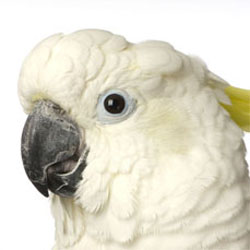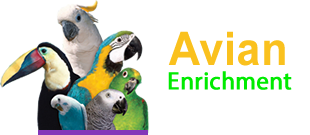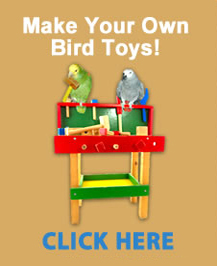 In the wild, parrots live and breathe in fresh air and they are not exposed to the types and levels of toxins present in our homes. Indoor air pollution is a major concern for all of us and even more of a concern for our birds. The air that surrounds us daily contains many allergens, pollens, molds, fungi, pollutants and dust. Our air tight, energy efficient homes just don't allow many of these indoor pollutants to escape. The conditions worsen when the weather is cold and we are unable to circulate fresh air from a source like a cracked window.
In the wild, parrots live and breathe in fresh air and they are not exposed to the types and levels of toxins present in our homes. Indoor air pollution is a major concern for all of us and even more of a concern for our birds. The air that surrounds us daily contains many allergens, pollens, molds, fungi, pollutants and dust. Our air tight, energy efficient homes just don't allow many of these indoor pollutants to escape. The conditions worsen when the weather is cold and we are unable to circulate fresh air from a source like a cracked window.
Parrots are extremely sensitive to the quality of the air environment around us. By design, to enable their ability to fly, their respiratory systems are highly efficient and virtually all of the air in their lungs is replaced with every breath. Birds also breathe at a much higher rate (25-40 times per minute) versus the typically respiration rate for humans (12-16). These factors combined mean that air pollutants can impact birds more quickly and more severely than humans. Canaries were used in the mining industry for this very reason; they served as an early warning system for the miners. Exposure to many pollutants can cause severe health problems, premature death and even an immediate fatality for your companion parrot.
A partial list of common household items that contain or generate toxic pollutants hazardous to birds follows:
- Non-stick cookware and other items that utilize teflon such as irons, ironing board covers, heaters and hair dryers which will release toxic gas when overheated. Read labels carefully on all household appliances!
- Tobacco products
- Aerosols (hairspray, deodorant, perfume, cleaners, fabric deodorizers)
- New carpeting
- Wood stoves, kerosene heaters
- Incense
- Scented Candles
- Air Fresheners
- Cleaning fluids
How to Improve Household Air Quality
- Remove all harmful chemicals and products from your house.
- Install an air purification system with HEPA filters and change filters often to eliminate harmful particulates and dust.
- Keep humidifiers and air conditioners clean and free from mold.
- Use bird safe cleaning products.
- Place houseplants around your home to purify air naturally.
- Don't smoke indoors.
- Remove birds from your house for at least a week if you plan on installing new carpeting. Ventilate your house thoroughly before allowing your birds to return home.
- Store hazardous chemicals and items, such as paint, in outdoor sheds.
- Have your furnace serviced annually to ensure efficient and safe operation and to minimize the risk of carbon monoxide poisoning.
NASA researchers completed a study which concluded that common household plants are effective in reducing indoor air pollution. For more details on recommended plants and the toxins they eliminate check out the article NASA Study House Plants Clean Air. Please note that some of the plants mentioned in the study may be hazardous to your parrot and should be kept a safe distance away to avoid ingestion.



















































































































































Comments powered by CComment